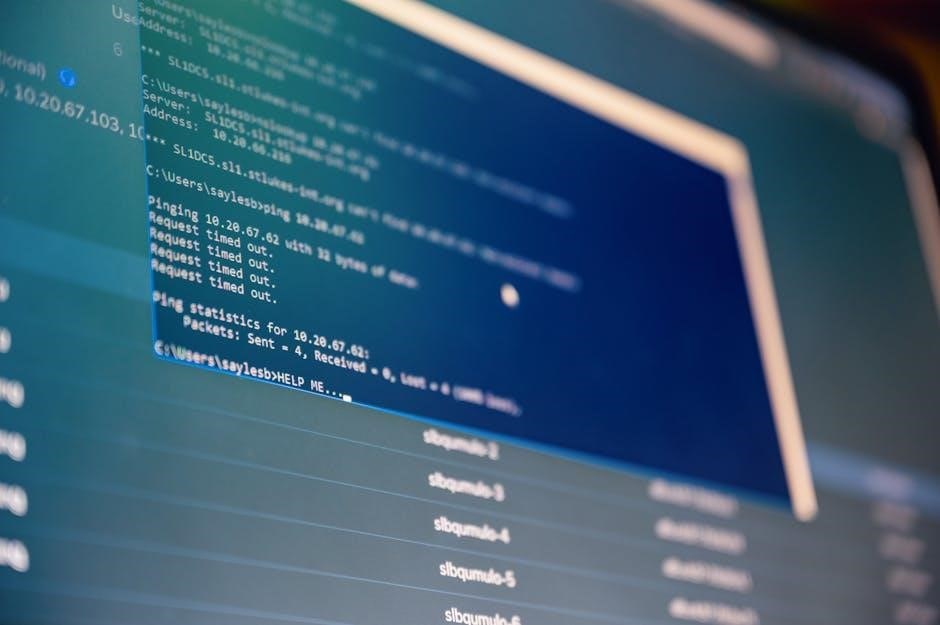The IPC is a model code regulating plumbing systems, ensuring safety and health standards․ It provides guidelines for design, installation, and maintenance of plumbing systems, including water heaters, sanitation, and drainage․ Published by the International Code Council (ICC), it is widely adopted globally․ The IPC is available as a free PDF download from the ICC’s website, making it accessible for professionals and DIYers․ It ensures compliance with safety standards for plumbing equipment and systems, promoting sustainable and efficient practices․
Overview of the IPC and Its Importance
The International Plumbing Code (IPC) is a comprehensive model code that sets minimum safety standards for plumbing systems, ensuring public health and safety․ It governs the design, installation, and maintenance of plumbing fixtures, water heaters, and drainage systems․ The IPC is widely adopted by jurisdictions globally, providing a uniform framework for safe and sanitary plumbing practices․ Its importance lies in safeguarding water quality, preventing contamination, and promoting efficient water use․ By adhering to the IPC, professionals ensure compliance with legal requirements and best practices, fostering trust and reliability in plumbing systems worldwide․ The code also supports innovation by allowing the use of new materials and technologies that meet safety standards․
Role of the IPC in Ensuring Plumbing Safety
The IPC plays a critical role in ensuring plumbing safety by establishing minimum regulations for the design, installation, and maintenance of plumbing systems․ It mandates safety standards for fixtures, water heaters, and drainage systems, preventing hazards such as scalding, backflow, and contamination․ The code ensures that plumbing systems are installed correctly, protecting public health and safety․ By enforcing these standards, the IPC helps prevent waterborne diseases and ensures safe water supply․ Regular updates to the code incorporate new technologies and materials, maintaining its relevance and effectiveness in safeguarding plumbing systems for both residential and commercial applications․ Adherence to the IPC is essential for preventing plumbing-related risks and ensuring reliable system performance․

Latest Editions of the International Plumbing Code
The 2021 IPC introduced significant updates, including provisions for multiple-user toilet facilities and rainwater harvesting systems․ The 2024 edition builds on this with new enhancements and developments․
2021 IPC Edition: Key Updates and Features
The 2021 IPC Edition introduced significant updates to enhance safety, efficiency, and sustainability in plumbing systems․ Key features include new provisions for rainwater harvesting, greywater recycling, and solar water heating systems․ It also expanded requirements for water conservation, ensuring fixtures meet stricter efficiency standards․ Additionally, the 2021 edition addressed emerging technologies, such as multi-user toilet facilities, to accommodate modern building designs․ These updates reflect a commitment to environmental sustainability while maintaining public health and safety․ The edition also streamlined inspection and testing protocols, making compliance more straightforward for contractors and inspectors․ These changes ensure the IPC remains a comprehensive and forward-thinking code for the plumbing industry․
2024 IPC Edition: New Developments and Enhancements
The 2024 IPC Edition introduces advanced updates to align with modern plumbing practices and sustainability goals․ It includes enhanced provisions for renewable energy integration, such as expanded requirements for solar thermal systems and geothermal applications․ New sections focus on water efficiency, with stricter standards for low-flow fixtures and greywater reuse․ The edition also incorporates improved safety measures, including updated testing protocols for backflow prevention devices and emergency plumbing systems․ Additionally, the 2024 IPC addresses emerging technologies like smart plumbing systems and automated water management solutions․ These updates ensure the code remains at the forefront of innovation while maintaining its core mission of protecting public health and safety․

Downloading the IPC PDF for Free
The International Plumbing Code is accessible for free on the ICC’s website in a nondownloadable format, ensuring legal compliance and easy access for professionals․
Official Sources for Free IPC PDF Download
The official source for the free IPC PDF is the International Code Council (ICC) website, offering the code in a nondownloadable format․ This ensures legal compliance and prevents copyright infringement․ Accessing the IPC through ICC’s platform provides the most reliable and updated version, essential for professionals․ The website features a user-friendly interface, allowing easy navigation to the desired code sections․ Additionally, the ICC offers a 45-day free trial for their premiumACCESS service, which includes advanced tools for code implementation․ This service is particularly beneficial for contractors, architects, and local authorities needing detailed insights and resources for plumbing system design and installation․ By utilizing these official channels, users can ensure they are referencing the most accurate and current plumbing standards, crucial for maintaining public safety and adherence to legal requirements․
Guidelines for Legal and Copyright-Compliant Access
Accessing the IPC requires adherence to copyright laws and official guidelines․ The International Code Council (ICC) retains the copyright, and unauthorized distribution is prohibited․ Users must obtain the IPC through ICC’s official website or authorized platforms․ The code is available for free in a nondownloadable format, ensuring compliance with legal standards․ For advanced features, ICC offers a 45-day free trial for its premiumACCESS service․ Violating copyright may result in legal penalties․ Always verify the source to ensure authenticity and avoid pirated versions․ Professionals are encouraged to use ICC’s resources to stay updated and compliant with the latest plumbing codes and regulations․

Structure and Content of the International Plumbing Code
The IPC is organized into chapters and sections, covering plumbing fixtures, water supply, drainage, and vent systems․ It includes detailed tables, figures, and appendices for clarity and compliance․
Chapters and Sections of the IPC
The IPC is divided into multiple chapters, each addressing specific aspects of plumbing systems․ Chapter 1 covers general provisions, while subsequent chapters detail requirements for water supply, sanitary drainage, vent systems, and storm drainage․ The code includes tables, figures, and appendices to provide clarity and guidance․ Sections within each chapter outline installation, material, and testing standards, ensuring compliance with safety and efficiency protocols․ The structured format makes it easy for professionals to navigate and apply the regulations․ The IPC PDF, available for free download, provides comprehensive access to these chapters and sections, serving as an essential resource for plumbers, contractors, and architects․
Key Topics Covered in the IPC
The IPC addresses essential plumbing topics, including water supply systems, sanitary drainage, venting, and storm drainage․ It covers requirements for fixtures, water heaters, and backflow prevention devices․ The code also includes provisions for medical gas systems, solar water heating, and rainwater harvesting․ Material specifications, installation methods, and testing procedures are detailed to ensure compliance․ Key topics further encompass safety measures, such as protection against contamination and scalding․ The IPC also provides guidelines for emerging technologies like greywater recycling and renewable energy integration․ These topics are presented clearly in the free IPC PDF, making it a vital resource for ensuring safe, efficient, and sustainable plumbing practices․

Safety Standards and Regulations in the IPC
The IPC enforces strict safety standards for plumbing systems, ensuring compliance with regulations to prevent hazards and penalties․ It covers water heaters, drainage, and system installations․
Plumbing Equipment and System Safety Requirements
The IPC outlines detailed safety requirements for plumbing equipment and systems to ensure compliance and prevent hazards․ It covers water heaters, pipes, fixtures, and backflow prevention devices, mandating regular inspections and testing․ The code also addresses ventilation and drainage systems, ensuring proper installation to avoid contamination and health risks․ Compliance with these standards is crucial for protecting public health and safety․ The IPC provides clear guidelines for equipment materials, sizing, and installation, fostering a safe and reliable plumbing infrastructure․ By adhering to these regulations, professionals can mitigate risks and ensure systems function efficiently and safely․
Material Specifications and Compliance
The IPC provides detailed material specifications for plumbing systems, ensuring durability and safety․ It mandates the use of approved materials, such as PEX tubing and copper pipes, that meet standardized testing requirements․ Compliance with these specifications is critical to prevent leaks, corrosion, and contamination․ The code also addresses the use of materials in water supply, drainage, and vent systems, ensuring they are resistant to chemical and environmental factors․ Adherence to these standards is essential for maintaining public health and safety․ Non-compliant materials can lead to system failures and health hazards, making compliance a top priority for professionals and DIYers alike․

IPC and Sustainable Plumbing Practices
The IPC promotes sustainable plumbing practices by emphasizing water conservation and energy efficiency․ It encourages the use of low-flow fixtures and renewable energy systems, reducing environmental impact․
Water Conservation and Efficiency Standards
The IPC establishes rigorous standards for water conservation, mandating low-flow fixtures and greywater recycling systems․ These measures reduce water consumption while maintaining performance․ The code requires efficient appliances and proper sizing of water supply systems to minimize waste․ Compliance ensures sustainable practices, aligning with global environmental goals․ The 2021 edition introduced updates on rainwater harvesting, enhancing water-saving initiatives․ By adhering to these standards, professionals can contribute to water conservation efforts effectively․ The free IPC PDF provides detailed guidelines, making it accessible for everyone to implement eco-friendly plumbing solutions․ These standards are crucial for promoting sustainability in modern plumbing systems worldwide․
Renewable Energy Integration in Plumbing Systems
The IPC promotes the integration of renewable energy sources into plumbing systems, enhancing sustainability․ It includes provisions for solar water heating and geothermal systems, reducing reliance on non-renewable energy․ The code supports energy-efficient designs, such as heat recovery systems, to minimize energy consumption․ These guidelines encourage the use of innovative technologies that align with environmental goals․ The 2021 IPC edition emphasizes renewable energy solutions, providing detailed requirements for installation and maintenance․ By incorporating these standards, professionals can create eco-friendly plumbing systems․ The free IPC PDF offers comprehensive insights into these renewable energy practices, ensuring widespread adoption and implementation․

Jurisdictional Adoption of the IPC
The IPC is widely adopted by local authorities globally, tailored to regional needs․ Jurisdictions modify the code to suit local regulations, ensuring compliance and safety standards․
How Local Authorities Implement the IPC
Local authorities implement the IPC by integrating its standards into local ordinances, ensuring compliance with safety and health regulations․ They adopt the code in its entirety or with modifications to suit regional needs; Officials conduct regular inspections to enforce adherence, leveraging the IPC’s guidelines for plumbing systems, water heaters, and drainage․ The code’s availability as a free PDF download facilitates easy access for enforcement․ Training programs for inspectors and plumbers are often conducted to ensure proper implementation․ This structured approach ensures that plumbing systems meet the required standards, safeguarding public health and safety while promoting sustainable practices․
State and Country-Specific Modifications
The IPC is adapted by states and countries to align with local regulations, climate conditions, and cultural practices․ Jurisdictions often modify the code to address specific needs, such as regional water conservation requirements or unique environmental challenges․ These modifications ensure the code remains relevant and effective in diverse contexts․ For example, some regions may adopt additional safety measures for seismic activity or integrate local building traditions․ While the IPC provides a comprehensive framework, its flexibility allows for customization to meet the unique demands of different areas․ This adaptability ensures the code remains a global standard while accommodating local priorities and legal frameworks․

Benefits of the IPC for Professionals
The IPC provides professionals with standardized guidelines, ensuring compliance with safety regulations and access to best practices․ It enhances credibility and efficiency in plumbing projects․
Plumbers and Contractors: Compliance and Best Practices
The IPC ensures plumbers and contractors comply with safety and legal standards, providing clear guidelines for installations․ It offers best practices for water supply, drainage, and equipment safety, ensuring efficiency and compliance․ Accessing the free IPC PDF enables professionals to stay updated on the latest regulations, such as the 2021 edition’s updates on water conservation and solar panel integration․ By adhering to IPC standards, professionals can avoid legal penalties and enhance their reputation for quality workmanship․ The code also supports sustainable practices, helping contractors meet modern environmental demands․ Regular updates ensure they remain informed about industry advancements, fostering reliability and excellence in their projects․
Builders and Architects: Design and Installation Guidelines
The IPC provides comprehensive design and installation guidelines for builders and architects, ensuring plumbing systems meet safety and efficiency standards․ It covers requirements for water supply, drainage, and venting systems, as well as material specifications․ The code promotes sustainable practices, such as water conservation and renewable energy integration, aligning with modern construction goals․ Architects can use the IPC to design systems that comply with local regulations and minimize environmental impact․ Builders benefit from clear installation standards, reducing errors and ensuring compliance․ The free IPC PDF download offers easy access to these guidelines, enabling professionals to stay updated on the latest industry practices and jurisdictional modifications, ensuring projects are both safe and innovative․

Historical Development of the IPC
The IPC has evolved from early editions to include modern updates, reflecting industry advancements and the ICC’s commitment to safety and innovation in plumbing standards․
Evolution of Plumbing Codes Over the Years
The International Plumbing Code (IPC) has undergone significant transformations since its inception, adapting to technological advancements and evolving safety standards․ Early editions focused on basic hygiene and sanitation, while modern versions incorporate sustainable practices and innovative materials․ The 2012 IPC introduced notable updates, including provisions for rainwater harvesting systems․ The 2018 edition expanded on these changes, enhancing requirements for water efficiency and storm drainage systems․ The 2021 IPC further prioritized water conservation, solar water heaters, and green technologies․ Each revision reflects a commitment to public health, safety, and environmental stewardship, ensuring the code remains relevant and effective in addressing contemporary plumbing challenges․
Significant Milestones in IPC Updates
The International Plumbing Code (IPC) has marked several key milestones in its updates, reflecting advancements in plumbing technology and safety․ The 2012 IPC introduced provisions for rainwater harvesting systems, promoting water conservation․ The 2015 edition expanded requirements for medical gas systems, enhancing healthcare facility safety․ The 2018 IPC updated storm drainage sizing and introduced provisions for commercial kitchen grease interceptors․ The 2021 edition emphasized water efficiency, solar water heaters, and graywater recycling․ The 2024 IPC is expected to focus on renewable energy integration and advanced material specifications․ These updates ensure the code remains aligned with global safety, sustainability, and innovation trends, providing a comprehensive framework for modern plumbing systems․

FAQs About the International Plumbing Code
Q: Is the IPC PDF available for free? A: Yes, the IPC PDF can be downloaded for free from the ICC’s official website in a nondownloadable format․ This ensures legal compliance and access to the latest plumbing standards for safe installations, benefiting professionals and DIYers alike․
Common Questions and Answers
Many users inquire about accessing the IPC for free․ The IPC PDF is available for free on the ICC’s website in a nondownloadable format, ensuring compliance with copyright laws․ This version allows viewing but not downloading or printing, which helps protect the document’s integrity․ Professionals often ask about updates, with the 2021 edition introducing changes like rainwater harvesting and solar panel integration․ DIYers seek guidance on applying the code to small projects, while contractors focus on compliance and best practices․ The ICC also offers a free 45-day trial for premium access, enabling users to explore advanced features and tools․ These resources collectively support safe and efficient plumbing practices worldwide, making the IPC an indispensable guide for all stakeholders․
Misconceptions and Clarifications
A common misconception is that the IPC PDF is entirely free to download and share, but it is copyrighted by the ICC․ While the code is accessible for free on the ICC’s website, downloading or distributing it without authorization violates copyright laws․ Another misunderstanding is that the IPC applies universally without modifications; however, local jurisdictions often adapt the code to fit regional needs․ Additionally, some believe that older editions remain sufficient, but updates like the 2021 and 2024 editions introduce critical safety and efficiency improvements․ Clarifying these points ensures proper use and compliance with the IPC’s guidelines, promoting legal and safe plumbing practices worldwide․
The IPC is essential for modern plumbing, ensuring safety, efficiency, and compliance․ Accessing the IPC PDF legally through official sources guarantees adherence to updated standards and supports safe practices․
Importance of Adhering to the IPC
Adhering to the IPC is crucial for ensuring public health, safety, and welfare․ It provides uniform guidelines for plumbing systems, preventing hazards and promoting efficient water and energy use․ Compliance with the IPC ensures legal adherence, protecting professionals and communities from potential risks․ By following the code, plumbers and contractors maintain high standards, reducing liability and enhancing system reliability․ The IPC also supports sustainable practices, aligning with environmental goals․ Accessing the IPC PDF from official sources ensures professionals have the latest updates, enabling them to deliver safe and compliant installations․ Ultimately, adherence to the IPC fosters trust and confidence in plumbing systems worldwide;
Final Thoughts on Accessing and Using the IPC
Accessing the IPC through official sources ensures compliance and reliability, providing professionals with essential guidelines for safe and efficient plumbing systems․ The free PDF download from the ICC website is a valuable resource, offering detailed standards and updates․ By using the IPC, plumbers, contractors, and architects can ensure their work meets legal and safety requirements, reducing risks and enhancing system performance․ Regular updates to the code reflect industry advancements, making it a critical tool for staying informed․ Utilizing the IPC promotes professionalism, sustainability, and public safety, making it indispensable for anyone involved in plumbing design and installation․

